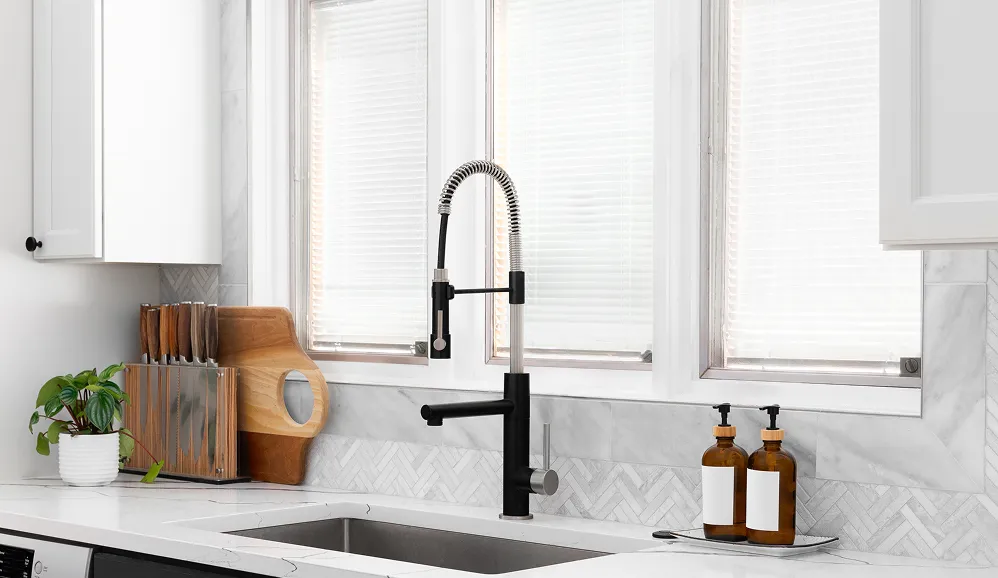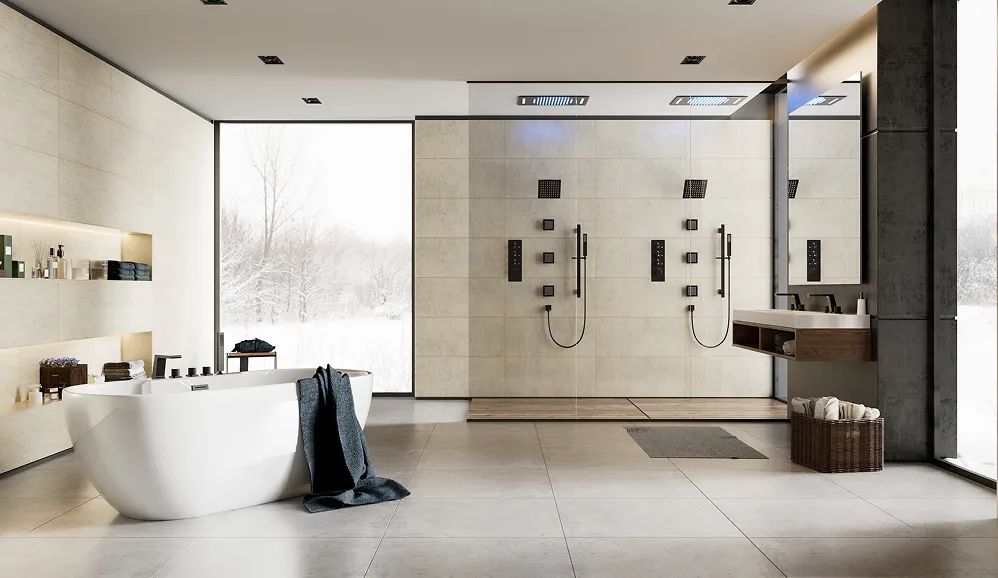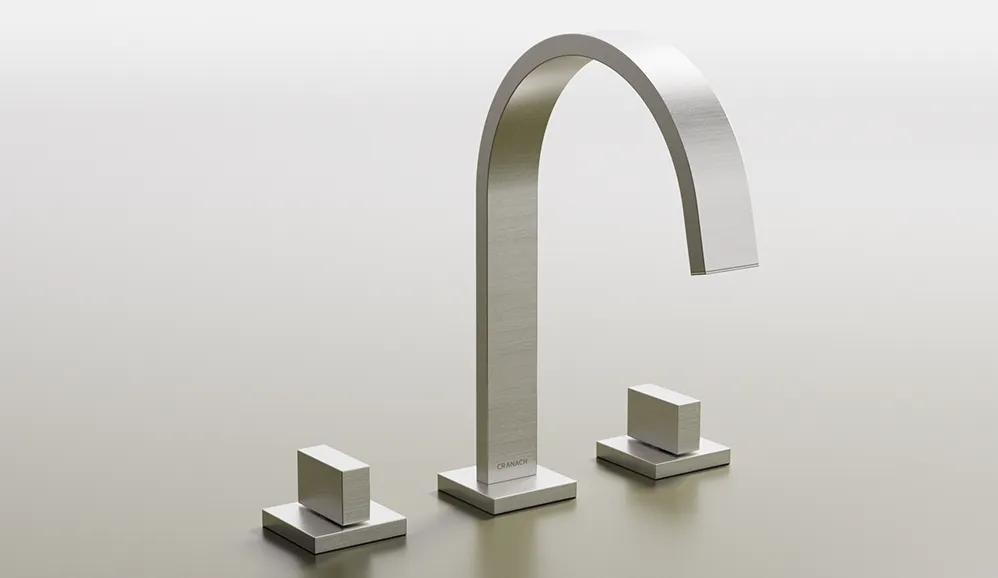Let’s settle the debate right away: is it bad to shower every day? For a lot of people, the answer is a surprising yes. A daily shower might feel like a non-negotiable part of your routine, but it’s often not necessary and can even strip your skin of its essential, protective oils and good bacteria.
The Truth About Showering Every Day
The urge to shower every day is actually a pretty modern habit. For most of human history, bathing was a much rarer occasion. Today, our hygiene practices are shaped more by cultural norms than by what our skin actually needs. From a dermatologist’s point of view, less is often more.
The secret is to tune into your skin’s unique needs instead of blindly following a one-size-fits-all schedule.
Your skin is home to a whole ecosystem of microorganisms called the skin microbiome. Just picture a tiny, invisible rainforest living on your skin’s surface, full of good bacteria that keep things balanced and fight off harmful germs. Over-showering—especially with harsh soaps and scalding hot water—can wreck this delicate environment, like a bulldozer tearing through a forest.
Why Less Can Be More
When you strip away these natural defenses, you leave your skin exposed and vulnerable. This disruption can trigger common issues that, ironically, people try to fix by washing even more:
- Increased Dryness and Itching: Washing away natural oils (sebum) leaves your skin dehydrated, irritated, and itchy.
- Flare-ups of Skin Conditions: If you deal with eczema, psoriasis, or just have sensitive skin, daily showers can make your symptoms much worse.
- A Disrupted Microbiome: Weakening your skin’s natural bacterial shield can, paradoxically, make you more likely to get infections.
According to data from Harvard Health Publishing, this daily habit is very common, particularly in countries like the United States. While many people shower daily, it doesn’t always line up with what doctors recommend. In fact, many medical experts, including those cited by resources like the Cleveland Clinic, will tell you that for most of us, showering just a few times a week is more than enough to stay clean without damaging our skin.
This habit is so ingrained that around two-thirds of Americans reportedly shower daily. But as medical professionals often point out, it’s not essential unless you’re getting really sweaty or dirty.
Ultimately, there’s no single “perfect” shower schedule. It’s personal, and it all depends on your activity level, skin type, and even the climate you live in.
Showering Frequency At a Glance
Feeling a bit lost? Don’t worry. Here’s a quick-reference table to help you figure out a showering schedule that might work for you based on some common factors. Think of it as a starting point.
| Activity Level / Skin Type | Recommended Shower Frequency |
|---|---|
| Sedentary Lifestyle & Normal Skin | Every 2-3 days |
| Active Lifestyle (Daily Workouts) | Daily, but keep it quick and lukewarm |
| Oily Skin | Daily, to manage oil and prevent breakouts |
| Dry or Sensitive Skin (e.g., Eczema) | Every 2-3 days with gentle cleansers |
| Hard Water Area | Less frequently (3-4 times a week) to avoid mineral buildup and dryness |
Remember, this is just a guide. The best thing you can do is listen to your body and adjust as you go. If your skin feels tight, itchy, or irritated, it’s probably telling you to cut back.
How Daily Showers Can Weaken Your Skin’s Defenses
Think of your skin as a fortress. The outer layer, what we call the skin barrier, is like a sturdy brick wall. Your skin cells are the bricks, and the natural oils (or lipids) are the mortar holding everything together. This wall is brilliant—it keeps essential moisture in and harmful irritants out. But when we ask, is it bad to shower everyday?, we’re really asking what that daily habit does to the mortar.
When you step into a long, hot shower, the combination of high heat and harsh soap acts like a solvent. It starts to dissolve that crucial lipid mortar, stripping away the protective oils and leaving microscopic gaps in your fortress wall. Over time, this daily wear-and-tear leaves your defenses vulnerable to attack.
The Invisible Ecosystem on Your Skin
Beyond just a physical barrier, your skin is also home to a bustling, invisible ecosystem called the microbiome. This community is made up of trillions of friendly bacteria and other microorganisms working around the clock to protect you. They fight off pathogens, reduce inflammation, and even help your immune system function properly. They are the silent guardians of your skin’s health.
But frequent washing, especially with those powerful antibacterial soaps, can throw this delicate balance into chaos. It’s like carpet-bombing the good guys along with the bad, leaving your skin’s natural defenses in disarray. This disruption often leads to a cascade of problems, from dryness and persistent itchiness to flare-ups of chronic conditions like eczema and psoriasis.
That “squeaky clean” feeling after a shower? It’s often a warning sign that you’ve stripped away too much. Healthy skin should feel soft and hydrated, not tight and dry. That tightness is your skin telling you its protective barrier has been compromised.
What Happens When the Barrier Breaks Down
Daily showers can strip away sebum, the skin’s protective oil, and disrupt the delicate skin microbiome. As we’ve seen, these microorganisms are vital for maintaining skin health and immune defense. Research shows that frequent washing, particularly with hot water, can lead to dryness, redness, and sensitivity.
Here’s a closer look at some of the common consequences of a weakened skin barrier.
This visual really drives home how excessive cleaning can disrupt the very systems meant to protect you, leading to common skin complaints. Daily showers, especially the hot ones, can strip your skin of its natural oils and weaken its protective barrier. Understanding how to support skin barrier repair is crucial for keeping your skin in top shape.
While this process affects your skin, it’s also worth noting how water and steam impact other parts of your body. Preserving these natural defenses is key to achieving long-term skin and hair health, turning your daily ritual into a practice that supports, rather than harms, your body.
Finding Your Perfect Shower Schedule
So, how often should you actually shower? There’s no single, perfect answer. The ideal frequency is deeply personal, a lot like figuring out the right skincare routine. The key is to stop following some rigid, daily rule and start listening to what your own body and skin are telling you.
Figuring out the right schedule means balancing your skin type, your daily activities, and even the climate you live in. These factors all work together to create a unique hygiene profile that dictates whether a daily wash helps or harms your skin. Answering the question “is it bad to shower everyday?” really means taking a hard look at your specific situation.
Adjusting to Your Skin Type
Your skin type is the most important piece of this puzzle. Different skin types have completely different needs when it comes to cleansing.
- Oily or Acne-Prone Skin: If your skin produces excess oil, a daily shower can be your best friend. It helps wash away the sebum that can clog pores and lead to breakouts. Just be sure to use a gentle cleanser to avoid kicking oil production into overdrive.
- Dry or Sensitive Skin: For those with dry skin or conditions like eczema, showering every two or three days is often much better. Washing less frequently helps preserve the natural oils that keep your skin hydrated and protected.
- Combination Skin: Got combination skin? You might need to find a middle ground. Pay close attention to how your skin feels day-to-day. A quick, lukewarm rinse on most days and a more thorough wash two or three times a week could be your perfect balance.
This image really drives home how over-showering can strip your skin, which is a major concern for anyone with dry or sensitive types.
You can see the visible effect of stripping away that natural moisture—a common result of showering too often, especially with harsh soaps.
Factoring in Lifestyle and Environment
Beyond your skin’s natural tendencies, your daily life and surroundings play a huge role in how often you need to shower. These external factors can completely change what your skin needs to stay clean and healthy.
According to dermatologists at the American Academy of Dermatology Association, there’s no official rule, but many people find that a few times a week is plenty.
Think about these variables when you’re building your routine:
- Activity Level: If you work out, sweat heavily, or have a physically demanding job, a daily rinse is probably a good idea to wash away sweat and prevent odor-causing bacteria.
- Climate: Living in a hot, humid environment might mean you need more frequent showers than someone in a cold, dry climate where skin is already prone to getting dried out.
- Occupation: It’s simple, really. A construction worker covered in dirt is going to need to shower more often than someone working in an office.
To make it easier, here’s a quick guide to help you find your starting point.
Personalized Showering Guide
| Factor | Oily Skin / Humid Climate / Active | Dry or Sensitive Skin / Cold Climate / Sedentary |
|---|---|---|
| Frequency | Daily or every other day | 2-3 times a week |
| Water Temp | Lukewarm to warm | Cool to lukewarm |
| Duration | 5-10 minutes | 5-7 minutes |
| Cleanser | Gentle, non-comedogenic cleanser | Mild, hydrating, soap-free cleanser |
| Post-Shower | Light, non-comedogenic moisturizer | Apply a thick moisturizer immediately |
This table isn’t a set of hard rules, but a flexible framework. Your perfect routine might be a blend of these recommendations. The most important thing is to observe how your skin reacts and adjust accordingly.
Ultimately, your shower should serve your body, not just be a mindless habit. When you adopt this flexible mindset, your daily wash transforms from a simple routine into a mindful practice. You can learn more about turning your shower into a restorative ritual by reading our guide to the wellness shower, a unique approach to cleansing the body. The goal is to land on a schedule that leaves your skin feeling balanced, comfortable, and healthy.
The Smart Way to Shower for Healthy Skin
It turns out that the answer to “is it bad to shower everyday” isn’t really about how often you wash, but how you wash. Adopting a few smarter showering habits can make a massive difference, turning what could be a damaging daily ritual into one that actually supports and protects your skin. Even if you love a daily shower, these simple tweaks will keep your skin happy.
The first and easiest change? Turn down the heat. I know, a steaming hot shower feels amazing, but scalding water is one of the biggest culprits behind dry, irritated skin. It strips away your natural oils much faster than lukewarm water ever could, leaving your skin’s protective barrier weak and compromised.
A good rule of thumb is to use water that feels comfortable but not hot. If your skin turns red, the water is definitely too hot.
Another key is to keep it short. Really short. Try to aim for showers that last no longer than 5 to 10 minutes. This gives you plenty of time to get clean without overexposing your skin to the drying effects of water and cleansers.
Choosing the Right Tools and Products
What you use in the shower is just as important as the water itself. Harsh, heavily fragranced soaps can throw your skin’s natural pH balance out of whack and strip away those essential protective oils. Instead, reach for gentle, pH-balanced, and fragrance-free cleansers.
You also don’t need to lather up your entire body every single time you hop in. Just focus on the areas that actually need a good cleaning—like your underarms, groin, and feet—and let the water rinse the rest. This simple shift helps your skin hold onto its moisture and maintain its healthy microbiome. To maintain healthy skin, you have to consider not just how often you shower, but also what you use. You can explore a range of effective bath and skin care practices to find what works best for your routine.
Upgrading Your Shower Equipment for Skin Health
Believe it or not, your shower hardware plays a surprisingly big role in your skin’s health. An old or basic showerhead can lead to wonky temperatures and excessively high water pressure, both of which can be pretty harsh on sensitive skin.
A modern shower system gives you precise control over these variables. You can set and maintain an exact lukewarm temperature, preventing the accidental scalding that strips skin oils. Better systems also regulate water flow, giving you a gentle yet effective rinse. For a detailed look at managing your shower’s output, check out our guide on how to increase water pressure in your shower for some great insights.
The CRANACH shower system, for example, was engineered with skin health in mind. Its thermostatic valve technology makes sure the water temperature stays perfectly consistent, protecting your skin from sudden, shocking heat spikes.
By investing in a quality shower system, you get so much more control over your environment, turning every shower into a more therapeutic and skin-conscious experience. The CRANACH shower system isn’t just designed for looks; it’s built for wellness, ensuring a consistent, gentle flow that cleanses without causing damage.
Making these small but meaningful changes—from the water temperature to the hardware you use—will help you find a healthy balance that keeps your skin clean, hydrated, and resilient for years to come.
Common Showering Myths Debunked
Navigating the world of hygiene advice can sometimes feel like you’re wading through a sea of conflicting information. So, let’s clear the air and tackle some of the most persistent showering myths out there.
Getting to the truth behind these misconceptions is a huge step toward building a routine that actually helps your skin, rather than works against it.
You might be surprised to learn that many common beliefs about what makes a “good” shower are actually counterproductive to your skin’s health. Separating fact from fiction empowers you to make smarter choices for your body.
Myth 1: Squeaky Clean Means Healthy Clean
We’ve all been there—that tight, squeaky feeling you get after scrubbing with a strong soap. It’s often mistaken as the ultimate sign of cleanliness. In reality, it’s a red flag.
That sensation means you’ve stripped away your skin’s natural, protective oils. This leaves its moisture barrier compromised and vulnerable to all sorts of irritation. Healthy skin should feel soft and hydrated after a wash, not taut.
This myth is a major reason people wonder is it bad to shower everyday. Chasing that “squeaky” feeling with harsh soaps can quickly lead to dry, unhappy skin.
Myth 2: Hot Showers Open Pores for a Deeper Clean
A steaming hot shower can feel like the peak of luxury, but it doesn’t actually “open” your pores for a deeper clean. Why? Pores don’t have tiny muscles to open and close.
What that scalding water does do is strip your skin of sebum, its natural moisturizer. This is a fast track to dryness, redness, and potential irritation.
According to the American Academy of Dermatology Association, excessively hot water can damage the keratin cells on your skin’s surface, which messes with their ability to lock in moisture.
Instead of cranking up the heat, stick to lukewarm water. It cleans just as effectively without causing the same level of damage. You might also be curious to learn how many gallons of hot water a typical shower uses to get a better handle on both your consumption and temperature. A quality shower system can be a game-changer for maintaining a consistent, skin-safe temperature.
Myth 3: Antibacterial Soap Is Always Better
Here’s the deal: unless a doctor has specifically told you to use it, you don’t need antibacterial soap for your daily shower. These powerful soaps can’t tell the difference between good and bad bacteria.
As a result, they wipe out the beneficial microorganisms that make up your skin’s protective microbiome, which can weaken its natural defenses over time.
For everyday cleaning, a gentle, pH-balanced cleanser is a much healthier choice. It gets rid of dirt and sweat without declaring war on your skin’s delicate ecosystem.
Striking the Right Balance for Your Wellbeing
So, is it bad to shower everyday? As we’ve seen, the answer isn’t a simple yes or no—it’s all about you. The goal isn’t to stick to some rigid schedule but to find a rhythm that keeps your skin happy and makes you feel good. Listening to your body is always the most important first step.
This means showering smarter, not harder. Think lukewarm water, gentle cleansers, and keeping your showers on the shorter side. It’s all about getting clean without stripping away the natural oils and defenses your skin works so hard to maintain. Upgrading to a quality CRANACH shower system can really help with this, giving you consistent temperature and gentle pressure that turns a daily chore into a therapeutic ritual.
While a good shower can be a fantastic mental reset and a proven stress reliever, its physical effects really depend on your technique. In fact, studies show that showering can improve self-reported health and kick fatigue to the curb. Scientific findings confirm what many of us already feel—the immediate wellness boost is real. The trick is to balance those feel-good moments with skin-safe practices to avoid long-term dryness and irritation. You can discover more insights about these health benefits here.
Frequently Asked Questions About Showering
Once you start thinking about your shower routine, a few questions are bound to pop up. We get it. Getting straight, practical answers helps you build a smarter hygiene practice without all the guesswork.
Here are some quick answers to the questions we hear most often when people start showering more mindfully.
Should I Shower After a Workout if I Already Showered?
Absolutely. A post-workout rinse is always a good call. It’s the best way to wash away the sweat, salt, and bacteria that can clog your pores and cause breakouts down the line.
But this doesn’t have to be a full-on, soapy scrub-down. A quick rinse with lukewarm water is usually more than enough to feel fresh without stripping your skin’s natural oils, especially if you’ve already had your main shower for the day.
Is It Better to Shower in the Morning or at Night?
This one is completely up to you. Honestly, there’s no wrong answer, and both morning and night showers have their perks.
- Morning Showers: A morning shower is like a jolt of energy. It can help you feel refreshed, alert, and ready to tackle whatever the day throws at you.
- Night Showers: Hopping in the shower before bed can be incredibly relaxing, helping you unwind and signal to your body that it’s time for sleep. Plus, it washes away the day’s grime and allergens, which is a huge plus for anyone with allergies.
The best time really just depends on your personal schedule and what feels right for your body.
Elevate your daily routine with a system designed for skin health and comfort. The CRANACH shower system provides precise temperature control and a gentle, consistent flow, transforming your shower into a therapeutic experience.










